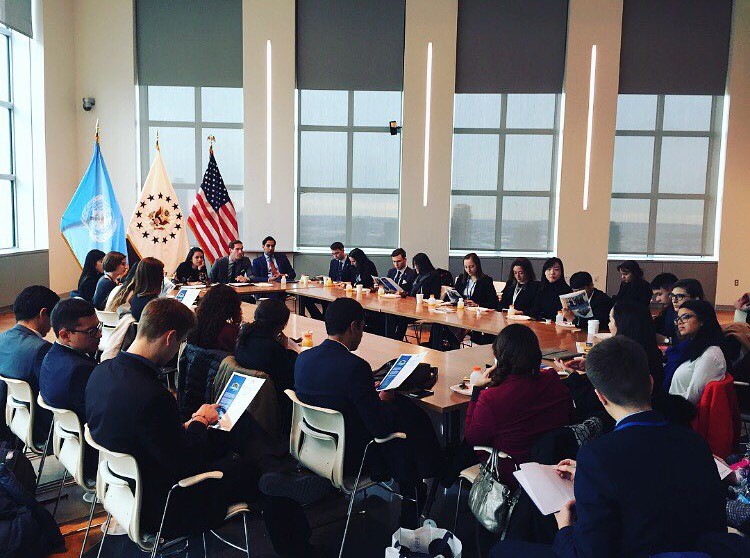How Connected Is The World? Reflections from the ECOSOC Youth Forum
How connected is the world? Playwrights like John Guare once said that everybody on this planet is separated by only six other people. Six degrees of separation. Last year, Facebook analyzed the degrees of separation of its 1.6 Billion users and found we’re all only separated by 3.57 other people! We’re living in a world that’s more connected than we could’ve ever imagined 20 years ago. The rise of globalization has allowed for innovation to skyrocket, for people to move across the world, and for knowledge to transcend borders. However, in many cases, it’s also left the most vulnerable behind.
On January 30th – 31st hundreds of youth leaders from around the world gathered at the United Nations to engage in crucial conversations with member states around challenges and best practices on the concept of “shared prosperity”. This year, the forum focused on one overarching theme: The world’s struggle to combat the negative effects of globalization.
In his opening remarks, the President of the United Nations Economic and Social Council, H.E. Mr. Frederick Musiiwa Makamure Shava, emphasized the Sustainable Development Goals’ ability to provide a blueprint that addresses the negative effects of globalization, and can ensure a future of shared prosperity. The ECOSOC Youth Forum serves as a platform for young people to engage with ministers of youth to discuss the role of young people in addressing these challenges and accomplishing the 2030 agenda. Throughout the two days, young leaders attended various breakout sessions where we had the opportunity to come up with recommendations that will be available at the High-level Political Forum, the UN’s central platform for follow-up and review of the 2030 Agenda.
Below you’ll find some of the highlights from these discussions:
- Current youth delegates, along with Ahmed Alhendawi, projected a strong call for UN member states to adopt a youth delegate program. This would enable young people to work with their official delegations to represent the voices of their countries youth at the UN.
- We discussed youth unemployment and the importance of creating decent jobs for young people. This is inevitably connected to more affordable education for all children regardless of their gender, ethnicity, or socio-economic status. Countries shared successful examples of how the private sector, civil society, governments, and youth organizations can help young people build relevant skills to survive in today’s labor markets. It was interesting to hear from countries like Argentina, which is experimenting with policies that incentivize private companies to train and hire underprivileged youth.
- We also discussed youth entrepreneurship in almost every session. This brought up topics of teaching financial literacy in schools, building and fostering environments that eliminate the fear of failure, and creating mentorship programs that guide young people throughout their business journeys.
You can view a full summary of what was discussed here.
On the eve of the second day of the forum, I convened with youth delegates from around the world to have deeper discussions around the issue of youth unemployment. I had the privilege of co-hosting this event at the US Mission to the United Nations alongside Andy Rabens, the Special Adviser on Global Youth Issues at the US State Department. We discussed the shared challenges young people are facing around the world. Each country faced unique challenges but there were common themes that surfaced:
- Lack of funding for youth led businesses/ non-profits/ initiatives
- Increased gap between those that benefit from the technological age and those that are left behind
- A business ecosystem that makes it difficult for young entrepreneurs to start, register, and grow their businesses
- A need for mentorship through a business’ life cycle, including continued training and education for business owners
- The ability to get rid of the fear of failure and learn how to make calculated risks
- In countries across Europe and the U.S. we highlighted the issue of young people being unable to find roles that push them to their full potential. Many young people have multiple degrees and are still unable to find decent jobs.
It was a fruitful discussion where we also highlighted programs and initiatives that are tackling these obstacles. Ahmed Alhendawi, the UN Envoy on Youth, stopped by to give some remarks right before officially ending his term as the UN Envoy on Youth. He mentioned that to succeed in today’s economic landscape, we must do 3 things: learn, unlearn, and relearn. Ultimately, we cannot avoid the realities of our new technological world, it has bounded people, cultures, ideas, and economies from around the world closer together. However, we must continue to fight inequalities that arise because of it.
Learn more about the ECOSOC Youth Forum.




